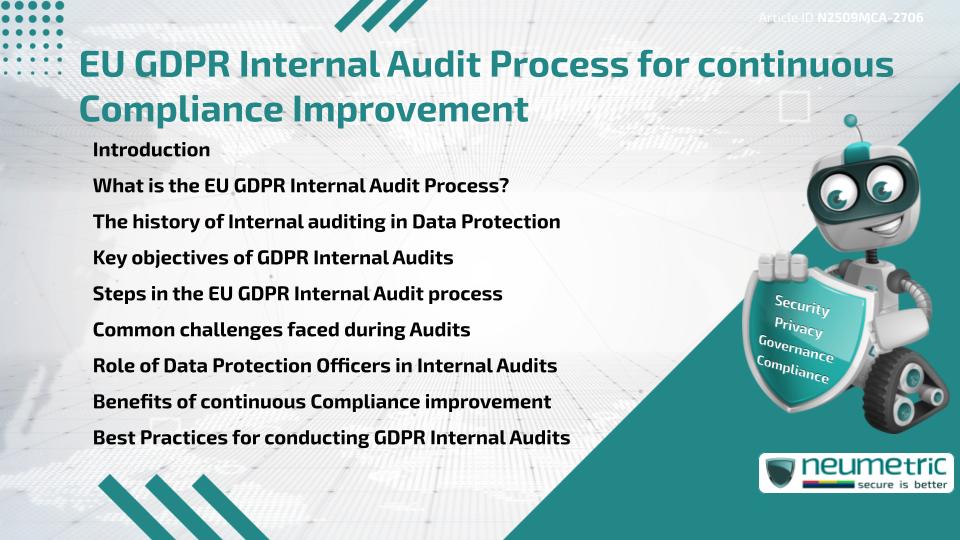Table of Contents
ToggleIntroduction
The EU GDPR Internal Audit process is a vital mechanism for ensuring that Organisations comply with the General Data Protection Regulation [GDPR] on an ongoing basis. Internal Audits help identify Compliance Gaps, assess Data Protection practices & provide Recommendations for improvement. By conducting Audits regularly, Organisations can reduce the Risk of Breaches, build stronger Trust with Stakeholders & avoid Penalties from Supervisory Authorities. Ultimately, the process supports continuous Compliance improvement by embedding Accountability into Business Operations.
What is the EU GDPR Internal Audit Process?
The EU GDPR Internal Audit Process involves systematically evaluating an Organisation’s Policies, Procedures & Systems against GDPR requirements. Unlike External Audits, which are typically carried out by Regulators or third parties, Internal Audits are initiated by the organisation itself. The goal is to identify areas of non-Compliance early, implement corrective measures & foster a culture of Data Protection.
The history of Internal auditing in Data Protection
Internal auditing has long been used in Financial & Operational contexts, but its role in Data Protection became critical with the adoption of GDPR in 2018. Prior to GDPR, the Data Protection Directive of 1995 did not impose consistent Audit obligations across member states. GDPR introduced Accountability as a legal requirement, making the EU GDPR Internal Audit process a central tool for demonstrating Compliance & readiness to Supervisory Authorities.
Key objectives of GDPR Internal Audits
The main objectives of GDPR Internal Audits include:
- Verifying that Personal Data Processing complies with GDPR principles
- Ensuring Data Subject Rights are respected & processes are in place to respond to requests
- Reviewing Technical & Organisational measures to protect data
- Assessing Data Retention, Consent Management & Cross-border Transfer practices
- Documenting Compliance for Transparency & Accountability
Steps in the EU GDPR Internal Audit process
A structured Audit process generally includes:
- Planning: Define Scope, Objectives & Audit Team responsibilities.
- Data mapping: Identify all Personal Data processed, Storage locations & Transfer mechanisms.
- Policy review: Examine Privacy Policies, Consent Records & Breach Response Plans.
- Interviews & Testing: Speak with Staff, review Systems & test Procedures.
- Reporting: Document Findings, highlight Risks & propose Corrective Actions.
- Follow-up: Ensure corrective measures are implemented & monitored.
Common challenges faced during Audits
Organisations often encounter challenges such as incomplete Data Inventories, poor Documentation & lack of Staff awareness. Limited Resources & complex IT Environments may also hinder thorough auditing. Another common issue is balancing Audit thoroughness with Business Operations, as Audits can be Time-consuming & Resource-intensive.
Role of Data Protection Officers in Internal Audits
A Data Protection Officer [DPO] plays a key role in the EU GDPR Internal Audit process. The DPO provides expertise on GDPR requirements, ensures Audits focus on high-risk areas & helps translate Findings into actionable Compliance measures. Acting as a bridge between Management, Staff & Regulators, the DPO ensures that Audits contribute to long-term Compliance improvement rather than short-term fixes.
Benefits of continuous Compliance improvement
Regular Audits provide more than just Compliance checks-they create a Framework for Continuous Improvement. Benefits include:
- Early detection & resolution of Risks
- Stronger resilience against Data Breaches
- Improved Staff awareness & Accountability
- Enhanced Trust with Customers & Business partners
- Reduced Likelihood of fines & Reputational damage
Best Practices for conducting GDPR Internal Audits
Organisations can maximise Audit effectiveness by:
- Scheduling Audits regularly, not only after Incidents
- Using standardised Audit Checklists tailored to GDPR requirements
- Involving Cross-functional Teams including IT, HR & Legal
- Documenting every step to provide Evidence of Compliance
- Following up on Recommendations & embedding them into Compliance programmes
Takeaways
- Internal Audits are essential for continuous GDPR Compliance
- Steps include Planning, Data Mapping, Testing & Reporting
- Common challenges include poor Documentation & Resource limitations
- DPOs play a central role in guiding effective Audits
- Continuous Improvement builds Resilience & Trust
FAQ
What is the EU GDPR Internal Audit process?
It is a structured evaluation of an Organisation’s Data Protection practices to ensure Compliance with GDPR requirements.
Why are GDPR Internal Audits important?
They identify Compliance Gaps, reduce Risks of Breaches & demonstrate Accountability to Regulators & Stakeholders.
How often should Internal Audits be conducted?
Audits should be carried out regularly, often annually or more frequently depending on the size & Risk profile of the organisation.
What role does a DPO play in Internal Audits?
The DPO guides the Audit process, ensures GDPR Compliance is prioritised & helps turn Audit Findings into practical improvements.
What are common challenges in GDPR Audits?
Incomplete Data Inventories, poor Documentation, limited Resources & complex IT Systems are frequent obstacles.
How do Audits support continuous Compliance improvement?
They create a cycle of identifying Risks, implementing Corrective Actions & monitoring effectiveness over time.
Do Small Businesses need GDPR Internal Audits?
Yes. Even Small Businesses must demonstrate Compliance, though their Audits may be more limited in scope.
Need help for Security, Privacy, Governance & VAPT?
Neumetric provides Organisations the necessary help to achieve their Cybersecurity, Compliance, Governance, Privacy, Certifications & Pentesting needs.
Organisations & Businesses, specifically those which provide SaaS & AI Solutions in the Fintech, BFSI & other regulated sectors, usually need a Cybersecurity Partner for meeting & maintaining the ongoing Security & Privacy needs & requirements of their Enterprise Clients & Privacy conscious Customers.
SOC 2, ISO 27001, ISO 42001, NIST, HIPAA, HECVAT, EU GDPR are some of the Frameworks that are served by Fusion – a SaaS, multimodular, multitenant, centralised, automated, Cybersecurity & Compliance Management system.
Neumetric also provides Expert Services for technical security which covers VAPT for Web Applications, APIs, iOS & Android Mobile Apps, Security Testing for AWS & other Cloud Environments & Cloud Infrastructure & other similar scopes.
Reach out to us by Email or filling out the Contact Form…


